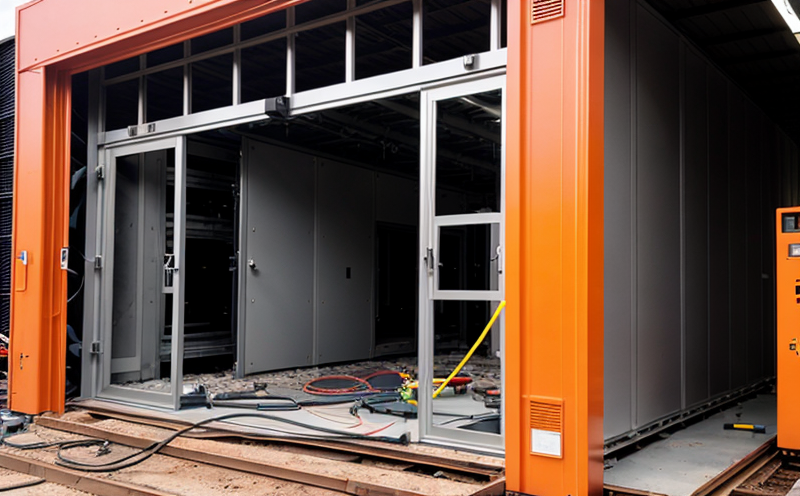SAE J2464 Thermal Abuse and Safety Testing of EV Battery Systems
The SAE J2464 standard is a critical protocol for ensuring the safety, reliability, and performance of electric vehicle (EV) battery systems. This test evaluates how well the battery system withstands extreme thermal conditions that may be encountered during use, charging, or accidental exposure to high temperatures.
Thermal abuse testing is crucial because it helps identify potential failure modes in EV batteries, which can lead to overheating and fire hazards. The SAE J2464 protocol requires the battery system to undergo a series of thermal stress tests that simulate real-world scenarios such as overcharging, short circuits, or exposure to high temperatures.
The testing process involves placing the battery module or pack in an environmental chamber and subjecting it to controlled temperature changes. The standard specifies precise temperature ramps and hold times designed to evaluate the battery’s ability to withstand extreme conditions without degrading performance or causing a thermal runaway event. This includes monitoring key parameters such as internal resistance, voltage, current, heat generation, and pressure.
The SAE J2464 test is not just about withstanding high temperatures; it also assesses the battery system’s recovery capabilities after being subjected to extreme conditions. The post-test evaluation checks if the battery can be recharged safely without compromising its integrity or performance. This ensures that EV batteries remain safe and reliable throughout their lifecycle.
The protocol is designed for a wide range of electric vehicle applications, from passenger cars to commercial vehicles. It aligns with international standards such as ISO 17269-3, which further emphasizes the importance of thermal abuse testing in ensuring the safety and reliability of EV battery systems.
At our laboratory, we use state-of-the-art equipment and facilities that meet or exceed SAE J2464 requirements. Our team of experts ensures that each test is conducted with precision and accuracy, providing clients with reliable data to support their product development and compliance efforts.
The benefits of this testing are manifold. For quality managers and compliance officers, it provides essential data for regulatory compliance and product safety assurance. R&D engineers can use the results to optimize battery designs and improve performance. Procurement teams benefit from knowing that the batteries they source meet stringent safety standards.
Industry Applications
| Application | Description |
|---|---|
| Pure Electric Vehicles (EVs) | Evaluating the thermal stability and safety of EV batteries under extreme conditions. |
| Hybrid Electric Vehicles (HEVs) | Ensuring that the battery system in HEVs can withstand high temperatures during operation or charging. |
| Commercial Vehicle Fleets | Testing the thermal resilience of batteries used in trucks, buses, and other heavy-duty vehicles. |
| Scooters and Motorcycles | Evaluating battery packs for personal transportation devices that might encounter high temperatures during use. |
| Battery Swapping Stations | Testing the thermal stability of batteries in environments where they are frequently exposed to varying temperatures. |
| Solar-Powered EV Charging Stations | Evaluating the impact of solar-generated heat on battery systems during charging. |
| Mobility as a Service (MaaS) | Ensuring that batteries used in shared vehicles are safe and reliable under various thermal stress conditions. |
Environmental and Sustainability Contributions
The SAE J2464 test plays a pivotal role in promoting sustainability within the automotive industry. By ensuring that EV batteries can withstand extreme thermal conditions, it helps prevent accidents caused by overheating or battery failures. This reduces the risk of fires and potential environmental hazards.
Additionally, the testing process is designed to minimize waste and promote recycling. By identifying potential failure modes early in the development stage, manufacturers can design batteries that are more durable and recyclable. This contributes to a circular economy by extending the lifecycle of battery materials.
The SAE J2464 protocol also supports environmental sustainability by aligning with global regulations aimed at reducing greenhouse gas emissions from transportation. By ensuring that EVs have safe and reliable batteries, it helps drive the transition to cleaner forms of transportation.
Use Cases and Application Examples
The SAE J2464 thermal abuse test is widely used in various EV applications. For instance, it can be applied to the development of batteries for electric buses, which are subject to high temperatures during operation due to their size and weight.
In another example, this protocol is essential for testing battery packs used in solar-powered EV charging stations. These systems must withstand both the heat generated by solar panels and the thermal stress from frequent charging cycles.
For scooter manufacturers, SAE J2464 helps ensure that their batteries can handle the heat generated during use while maintaining safety standards. This is particularly important for scooters used in hot climates where temperatures can exceed 50°C (122°F).
In commercial vehicle fleets, this test ensures that battery systems are robust enough to withstand the thermal stress of long journeys and frequent charging cycles.





